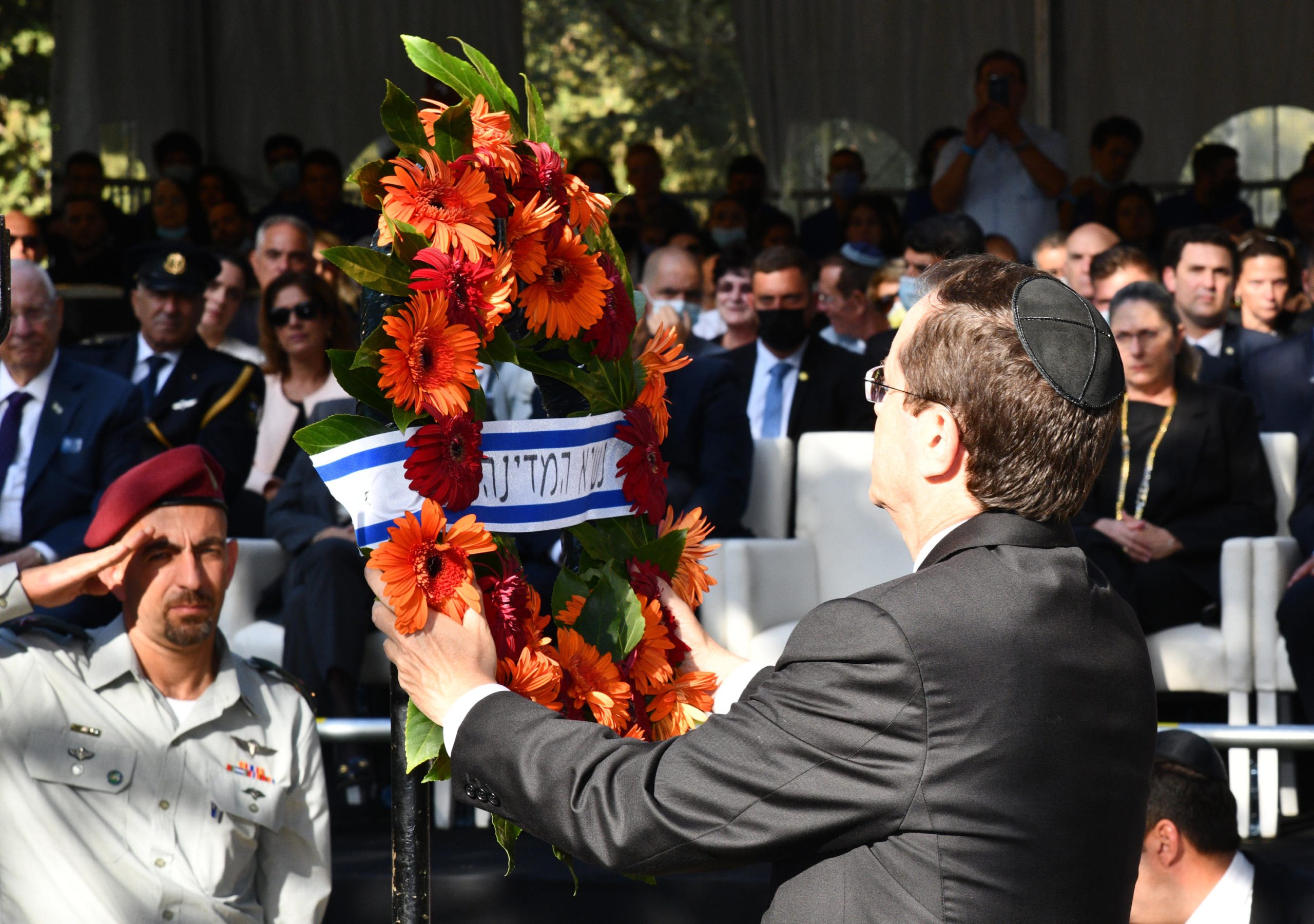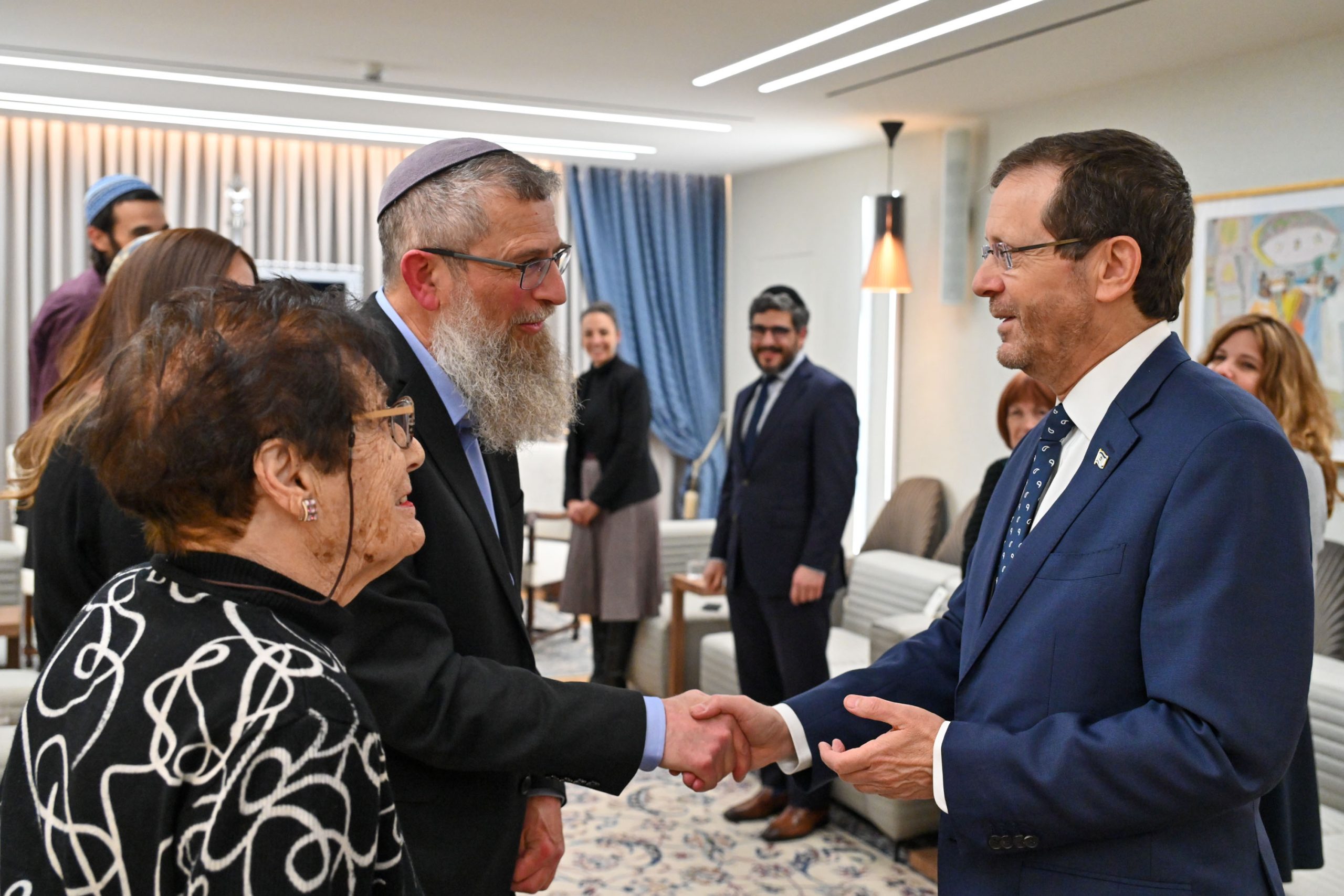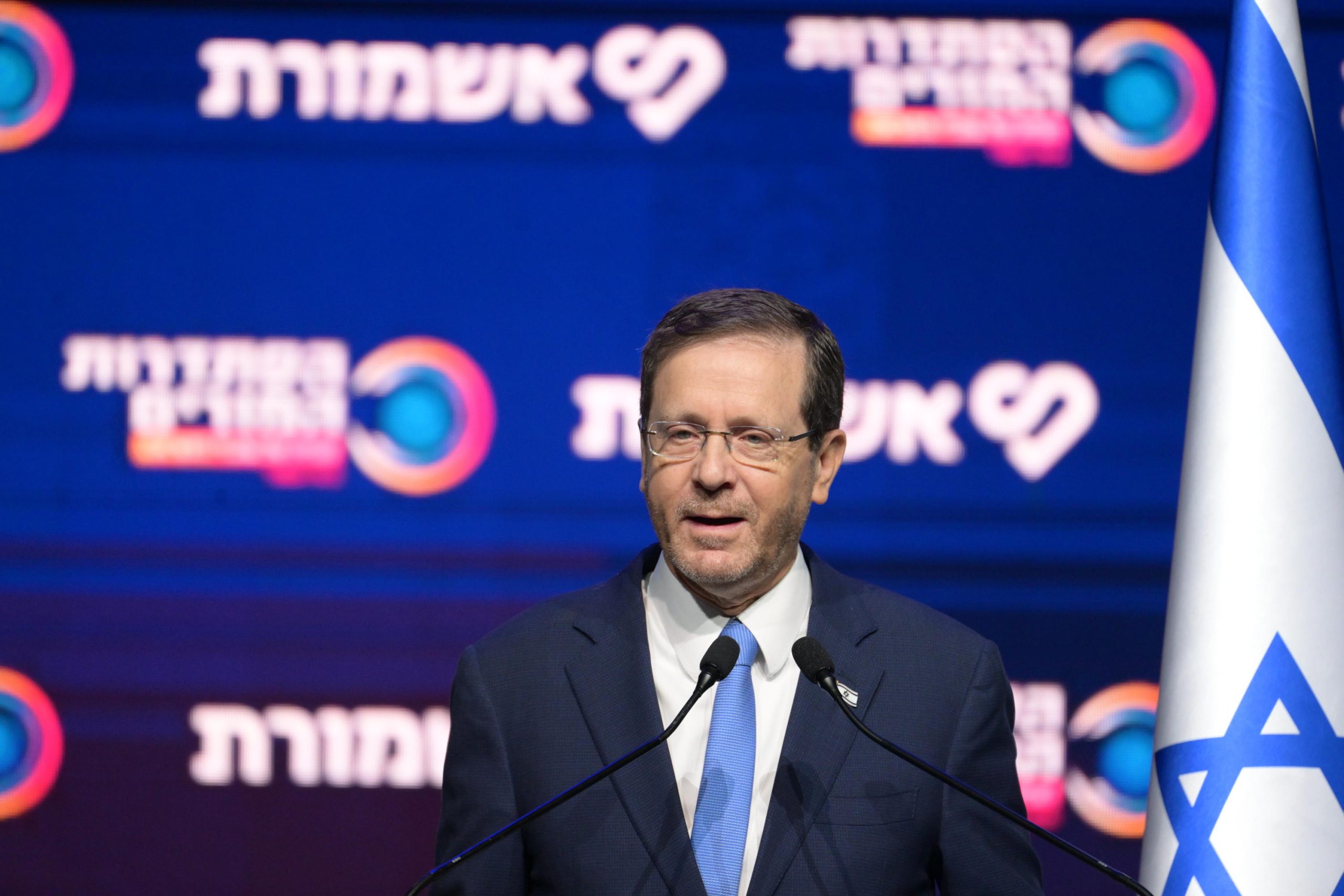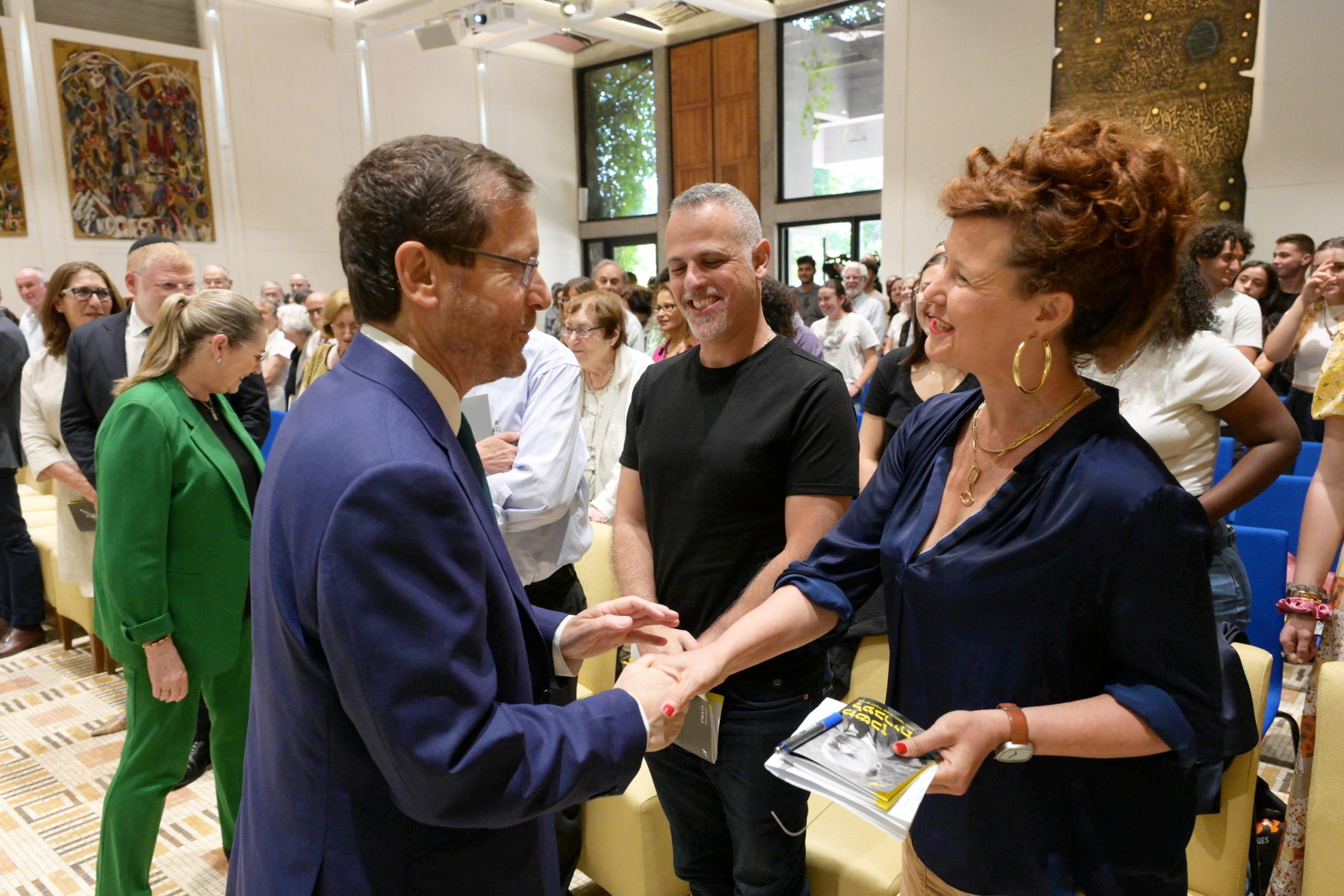President Isaac Herzog’s speech at the official memorial ceremony for Yitzhak Rabin on Mount Herzl, marking 26 years since his murder, 28 October 2021
keywords: אזכרה, יצחק רבין, אלימות והסתה, דמוקרטיה

Credit: קובי גדעון, לע"מ
There are some leaders for whom the passage of time since their passing only accentuates the magnitude of their loss. There are some leaders, the longing for whom becomes more and more tangible every year. Yitzhak Rabin, an Israeli hero, was one such leader. Year by year I stand here, at his grave; year by year I think about him, I think about us, and try to remember. And not just because of the warm personal ties between us and between our families, but because I cannot shake off the pain, because in my mind Yitzhak Rabin had to be a figure in the broadest possible consensus, in the Israeli consensus. Let me explain why: Yitzhak Rabin embodied it all. He passed through all the most important and highly regarded stations in Israel’s ‘resurrection,’ always animated by a sense of mission, by love for his people and his land. His identity, his experience, his personal attributes—all these were of the sort that attracts admiration across the divide… In perhaps the greatest historical privilege of all, he served as the IDF Chief of Staff who united Jerusalem.
In all our preoccupation with arguments, and focus on them, we forget that Rabin, a beloved son of Jerusalem, was a man ‘tasked by fate,’ in the words of Haim Hefer, ‘to be the envoy of all dreams and prayers’; to head the army at one of the most historic and exciting moments of the Jewish people throughout the ages: the unification of our eternal capital. Rabin was also a public servant in many other public roles. As an ambassador, a member of Knesset, a minister in Israel’s governments, and twice as prime minister. He was open-hearted and open-minded, a man of extreme integrity. He was a war hero and a peace hero, and it was his actions that have since led us through a historic and long-term process into the present, to regional accords such as the Abraham Accords, relations with Morocco, which he established, and more. He boosted our society and economy, enhanced our education and welfare, and integrated and strengthened Arab society. His character was holistic; not perfect, but complete. And even when he failed, he was not afraid to take responsibility. As I said, Yitzhak Rabin should have been in the heart of our consensus, an object of identification for all parts and stripes of our nation. A unifying figure. Today, we must remember that. Today, we must commit to make every effort, to restore him to the heart of our national consensus.
“Ladies and gentlemen, here too, with you, I look back at those days and try to understand how it could have been that Rabin—the Rabin we all grew up seeing as a hero, as a model, as a military and political leader, who was truly admired by the public and such diverse communities—how he, of all people, was turned by despicable characters, ordinary citizens, into a traitor. A traitor?! Obviously there was a debate about his diplomatic policies, but a political argument never justifies such terrible labelling. Moreover, I argue that this is not even the point. The point and the discussion must shift somewhere else entirely! I think that this was the breaking point at which we, as a society, stopped embracing complexity. A period in which incitement burned and swept away everything, a period in which we lost our appreciation for Israel’s diversity, the diversity of identities and opinions, and we stopped seeing the unique character of the individual. A period in which we started painting everything in black and white. And when there is no complexity, everyone starts asking: who is on my side, and who is against me? And there is nothing to talk about with those who are against me, and there is no way to create partnerships with those who are against me, and I don’t want to get to know and meet those who are against me, to feel their pain, and to dream with them about a better future. And those who are against me, I shall label ‘traitors,’ and if necessary, I shall murder them as well! I think we ceased to understand that complexity is a good thing, and that if we cannot listen to and appreciate even people who are different from us, we are one short step from the destruction of our shared home.”
Twenty-six years have passed since then. Israel is now home to millions of citizens for whom the murder occupies neither a page nor a chapter in their personal memories. And as the years go by, the challenge of commemoration and study becomes more complicated: how do we reflect on the painful months that preceded the murder? How do we go back to the dangers of the incitement that ripped us apart as a society and opened a rift between us? How do we avoid generalizing about entire groups in our society and smearing them as guilty? How do we guarantee that the lessons of the terrible murder of an Israeli prime minister resonate so that we never experience a similar event again?
Ladies and gentlemen, technological progress, which is reaching new heights every day, has many advantages, which are dramatically transforming our lives. But unfortunately, it has also become an available and hugely influential tool for the dissemination of incitement and hatred with intolerable ease. The writer Micah Goodman recently addressed this danger in his important book “The Attention Revolution,” writing: ‘In recent years, political discourse has migrated from the streets to the Internet. Social media platforms are the new soapboxes. And as the conversation migrated online, it evolved. This medium is making the messages more impassioned, more extreme, and more divisive.’
Leaders of this country, opinion leaders and citizens, I implore you from this mountain: in this situation, especially in this situation, raise a voice of moderation, of reconciliation, of outreach, of mutual respect! Empower what we have in common, not what divides us. And do this not only with your words but also, and especially, with your keyboards! Because here, especially here, in front of the grave of the Israeli hero Yitzhak Rabin, we remember the lesson that we all learned about the dangers of polarization and division. Here we remember how twenty-six years ago, we witnessed just how slippery the slope is between invective words and dangerous deeds. Like bullets driven into the back of a leader.
I believe that we must restore our ability to embrace complexity. We must correct this distortion. Yitzhak Rabin must return to the heart of our national consensus not because of his death but because of his life. Not only the circumstances of Rabin’s death must unite us, but also his actions and his pioneering, Zionist, mission-driven path; a path full of love for the State of Israel and all its citizens, from all communities; his hand extended in peace; his love for the Jewish People and the eternal connection to Jerusalem! We must return to the character and life story of the leader who fell on active duty because of his path, because of his beliefs. May the memory of Yitzhak and Leah Rabin be forever inscribed in the nation’s heart.”





